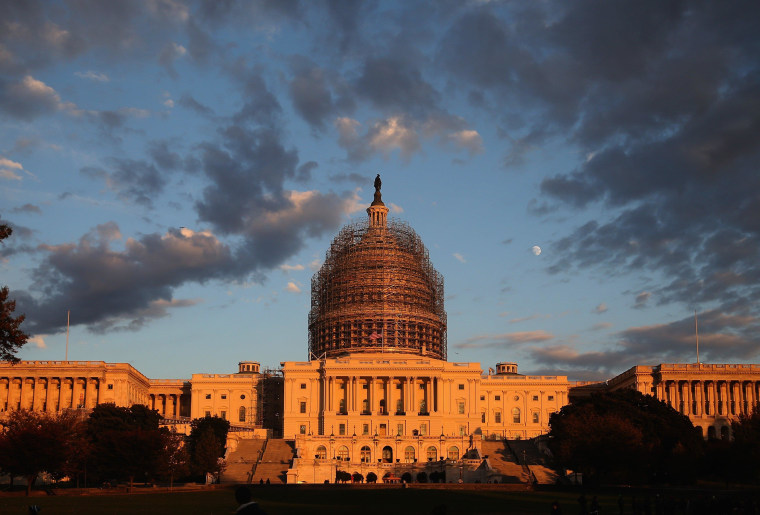The looming case of possible federal corruption charges hanging over Senator Bob Menendez and the rumored ascendance of Housing Secretary Julian Castro as a possible favorite for the vice president spot under Hillary Clinton underscores the growing role Latinos will play in national politics. But it also highlights the limited opportunities Democrats have with Latino candidates that may garner a national appeal.
It's sobering to think that if Senator Menendez were to leave office for whatever reason Democrats would lose their only Latino representative in the US Senate. Republicans, on the other hand, would boast two Senators, Marco Rubio and Ted Cruz.
The loss of the only Latino Senator would be a significant hit to the image of the Democrats at the national level as a party of diversity, which should make Mr. Castro’s rise an important consideration for the party. Republicans also claim the only two Latino governors in the country, as well, Governors Sandoval of Nevada and Martinez of New Mexico.
The rise to national prominence for Latinos requires broad appeal, not just popularity among Latino voters. Mr. Castro’s move out of San Antonio, where he was Mayor, to Washington D.C. was acknowledgement that he had virtually no shot at statewide office in Republican-heavy Texas. Grooming him for national office through Texas would be more difficult.
A move out of Texas gives him greater visibility and the Democrats are hoping he can mobilize Latino voters while keeping hold of crucial white voters. With degrees from Stanford and Harvard, Castro’s roots are solidly planted in the United States where his family goes back several generations in Texas.
Democrats still dominate Latino representation in the House of Representatives among the states, with 23 Latinos compared to 9 for the GOP, but almost all the Democrats represent districts with a plurality of Hispanics, or in majority-minority districts. If Latinos are to rise to national prominence the Democrats must seek out those promising Latinos that transcend Latino politics, just as President Obama has risen to the top by transcending black politics and capturing a vision of America that appeals to multiple lenses, as well.
Latino representatives in Hispanic districts make a poor stable of recruits to choose from to groom for national office, with little experience in making these broader appeals to the general American electorate.
Perhaps this is why Latinos have risen higher within the Republican Party, while Democrat Latinos dominate local offices. Rising through the ranks of a party dominated by white voters, Republican Latinos are required to appeal to an electorate beyond the Latino narrative. This makes the potential loss of Senator Menendez a weighty structural barrier to overcome within the way Democrats do business.
The response to this argument, though, is that without districts drawn out for minority representation, these minority representatives would be less likely to exist. Fair enough, and kudos to the Democrats for making the concerted effort over the last few decades to address the lack of representation among minorities. Republicans in California are only now beginning to organize institutional efforts towards recruiting Latino candidates. Grow Elect, a conservative political action committee (PAC) in California run by an long established Latino Republican, Ruben Barrales, claims to have helped over 90 Latino candidates win local elections.
The National Association of Latino Elected Officials (NALEO) has been counting the number of Latino elected officials in the United States since 1984. At their latest count they report that there are 5,750 Latino elected officials across the country, with almost 90% of the partisan offices being held by Democrats. Still, with so many Latinos in office as Democrats, Mr. Castro is the only prominent Latino on the list for vice president.
The importance of a national Latino figure is difficult to understate going into 2016. President Obama was able to win two elections with a coalition of progressive whites, African Americans, and Latinos. The greatest concern for Democrats with Hillary Clinton will be less about vote choice, and more about voter turnout.
Political scientists who study Latino political behavior have pointed out the “mobilizing effect”of Latino candidates, where Latinos are more likely to turn out to register to vote and to go to the voting booth on Election Day if there is a Latino candidate.
The historical significance of a Julian Castro supporting the first woman candidate for President would be an almost overpowering mobilizing force for the Democratic coalition. If Senator Menendez were to leave office, this leaves a gaping hole in the image of the Democrats as the party of diversity at the national level. Julian Castro may be able to fill that space for the Democrats and use his prominent status to forge a path closer to the White House than any Latino has ever been. In the meantime, Democrats need to build a bench of Latino candidates with broader appeal.
